Tickling Our Fancy 101: Comorian, Nous Alpha, IKLAN, Koma Saxo, Lisa Gerrard & Jules Maxwell…
April 27, 2021
ALBUM REVIEWS/Dominic Valvona

Lisa Gerrard & Jules Maxwell ‘Burn’
(Atlantic Curve) 7th May 2021
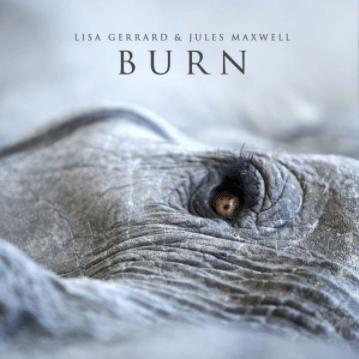
Those already enraptured by the sublime billowing vistas and ethereal music of the four-decade spanning Dead Can Dance will quite rightly settle for nothing less than the stunning. Those fans will be hoping for the best in light of this new project conceived by that partnership’s leading siren Lisa Gerrard and the most recent member to join the Dead Can Dance fold (playing keyboards and co-composing for the Melbourne-birthed band since the world tour of 2012) Jules Maxwell.
Well, I can tell you it’s a sonic-voiced match made in the heavens; every bit as grandiose, visceral, dreamy and moving as anything Gerrard recorded under the DCD banner. Once more in the amorphous swell and vapour of atavistic and more recent cultural influences, myth and folklore whilst progressing towards something new, Gerrard and Maxwell conjure up a visionary, filmic opera of the neo-classical and electronica.
The quality and scope of elementals are unsurprising, with the contralto/mezzo-soprano voiced Gerrard channeling past collaborations with Bulgarian choirs, the otherworldly and cinematic, and her foil the Irish theatre composer, songwriter bringing his explorative grandeur.
Two become three with the addition of the English record producer, Last Space Recordings label founder, songwriter, remixer and artist in his own right (under the MAPS guise) James Chapman, who brings yet another air of experimental sophistication and some more horizon-gazing to the project.
Before we continue we need some background to how this immersive triumvirate took shape. The story goes right back to Maxwell’s inauguration as a live band member of, the long established, Dead Can Dance band in 2012. Not only playing keyboards but also already starting to write material from the outset with Gerrard, this creative partnership’s blossoming ‘Rising Of The Moon’ suite became the band’s final encore choice. Moving forward a few years, and having now struck up a certain ‘affinity’, Maxwell invited his siren partner to co-write songs for The Mystery Of The Bulgarian Voices project; travelling to Gerrard’s Australian studio to put this beautifully conceived choral requiem together. It was during these sessions that the duo also began writing ideas and conceptions for what would be the cerebral Burn album saga.
Chapman’s involvement stemmed from an introduction through Maxwell’s publisher over dinner in Sofia: proposed as a possible congruous edition to an already artfully transportive collaboration.
Fast forward to the pandemic epoch, and with the trio now scattered between three locations (Gerrard in Australia, Maxwell in France and Chapman in England), Burn finally and thankfully made it. And what an album experience it is; a slow-released epic of deep yet gauzy and ambitious dense atmospheric layering. Gerrard is as ever on a whole different plane to anyone; one minute dredging the longing yearn of shield maidens and at other times singing in diaphanous, weep inducing tongues like an operatic aria version of Elizabeth Frazer. She evokes everything from Fado and the Celtic, to the Ancient proscenium; a worldly amorphous intake of influences that stretches from the Balkans to Anatolia. She even made me bloody cry on the interstellar veneration, and one of the album’s stand-out grand scale longing visions, ‘Orion (The Weary Huntsman)’.
It’s passionate, stirring stuff that fills the soul, set to a musical score that transduces the synthesized film soundtrack futurist rayed visions of Vangelis (and a touch of Moroder), the pulsed emotive moody basslines of In Rainbows era Radiohead (‘All I Need’ springs to mind), slow controlled swelling drums, the celestial and beatific cathedral ascendance. The themes are no less full of both the same gravitas and the more tactile: made even more prescient and personal in the current isolating pandemic. Yet the sagacious title track is itself an invitation to (no less) “walk in peace, unlock the passive passion within, engage in the diversity of life and celebrate.”
So unbelievably beautiful in parts and always emotionally powerful, Burn is an incredible statement from this creative communion. A triumph even and among the best, most heart aching and immersive experiences you’ll hear this year: nothing short of sublime.
Comorian ‘We Are An Island, But We’re Not Alone’
(Glitterbeat Records) 7th May 2021
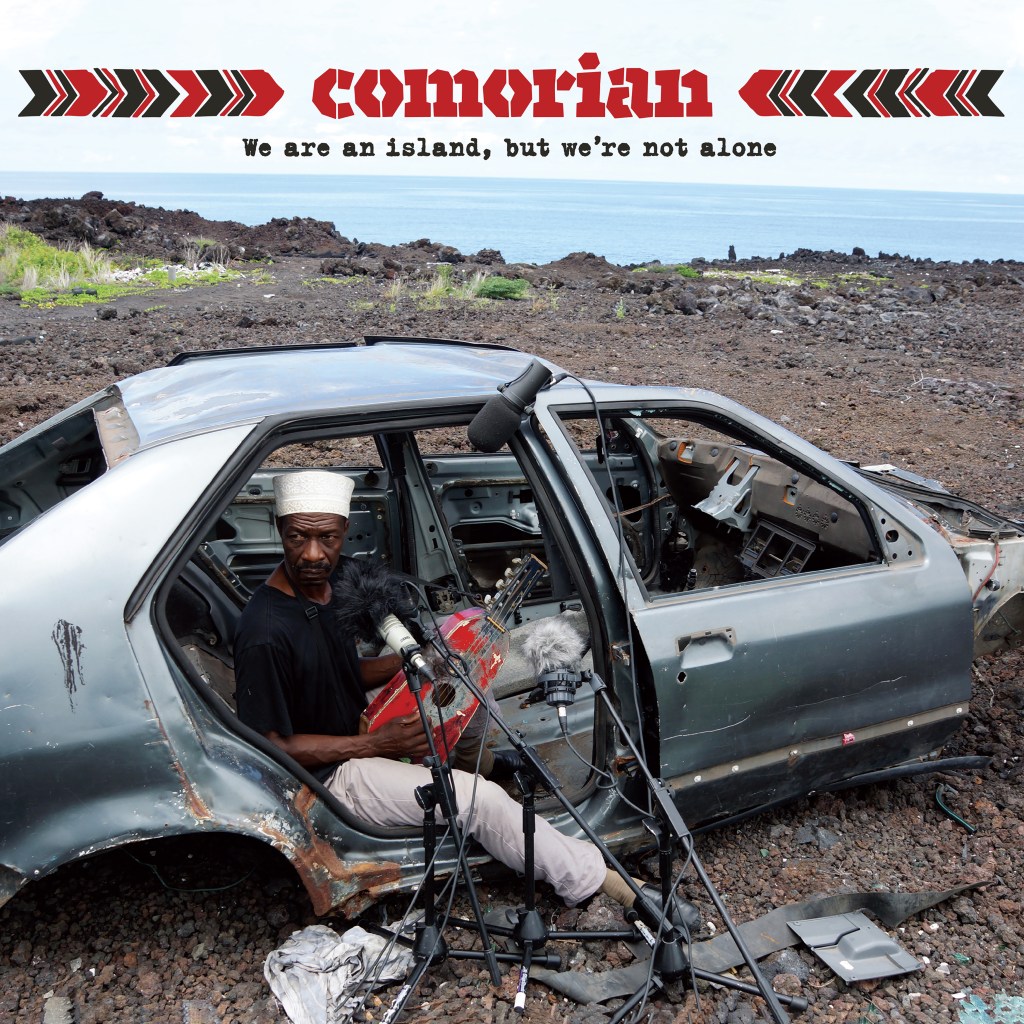
A crossroads of migratory civilizations in the Indian Ocean, the volcanic archipelago of islets collectively known as the Comoro Islands lies between Madagascar and the mainland African coastline of Mozambique (located in what is referred to as the Mozambique channel to be precise). Though the exact date of human habitation is vague – dating to somewhere in the 6th century – these distant islands are populated by the ancestors of those oceanic travellers from the Middle East, Africa and even further afield. In the 19th century it was the turn of European colonization, with the French planting a flag on the relatively far-flung islands. And so amongst the local Comoran dialect (a mixture of both Swahili and Arabic) and Arabic languages you’ll also find French being spoken and used still to name the largest of the Comoro Island’s, ‘Grande Comore’. It’s the location that the Grammy Award winning producer and polymath Ian Brennan and his partner (and wife) on such ventures, the Italian-Rwandan filmmaker, author, activist and photographer Marilena Umuhoza Delli, travelled to record the latest installment of blog favorites Glitterbeat Records’ Hidden Musics series.
Brennan is once more well-matched for the task of capturing the raw, unfretted and most direct performances of those African islands, having already travelled to some of the world’s most dangerous, furthest places; recording all but one volume of this now eight volume series for the label. Previous editions have taken Brennan (twice) to Pakistan (Ustad Saami ‘Pakistan Is For The Peaceful’ and ‘God Is not A Terrorist’ albums), Cambodia (‘They Will Kill You, If You Cry’), Vietnam (‘Hanoi Masters’), Rwanda (‘Why Did We Stop Growing Tall’) and Ghana (Fra Fra ‘Funeral Songs’). Many of these recordings have acted almost like healing sessions, whilst others have amplified the voices of many oppressed, forgotten and ignored ethnic communities.
The whole Hidden Musics raison d’etre is to illuminate ‘localized sounds that are time-honored’ and bound to a specific place, culture. You couldn’t get much more obscure and hidden than this latest excursion. Brennan’s air miles must be jaw dropping, with this journey alone taking six flights to reach the final destination.
Painting a vivid and desperate picture of Island life (as laidback as it is), Brennan’s own linear notes describe such illuminating observations as the sunblock mud masks worn by local women, the litter strewn lapping tides that throw up a world’s ocean of international crap against the beachside walls of the President’s Palace (previous coup leader Azali Assoumani holds that role in case you were asking), and Comorian’s relationship to the car. As Brennan found out, there’s just as many empty car wrecks, strewn at the side of the Island’s few roads, as there are working ones. It’s the shell of one such abandoned car that the producer used as the most rudimental of on-location studios; shielded from the harsh winds blowing in off the Indian Ocean.
Packing light as usual, and setting up the most nonintrusive of recording apparatus, Brennan presses record and let’s the natural surroundings take their course – there’s a great anecdote about breaking a cardinal rule of recording; packing up too early, but determined to catch what would have perhaps been one of those empirical moments in the sodden rain with just a handheld back-up mic and device, only to find the moisture had killed it.
Attempting even to find the Island’s musicians proved almost as convoluted as the journey; a contact of a contact introduces Brennan to the album’s eventual stars Soubi, his musical mentor partner Mmadi and the guma drummer and background vocalist D. Alimzé. Unfortunately the legendary reputation of the Island’s ‘ndzumara’ players (a sort of double-reed pipe; a primitive oboe if you will) is declared ‘dead’ upon arrival. Soubi and Mmadi however seem to have mastered it – sounding at times like a weird kazoo at times when things get excitable.
Renowned for letting events take their course, with little, even no interference (even post-production, which is often done there and then) Brennan puts his trio subjects at ease. The music, utterances, yearns and roots-like blues exaltations just flow because of that hands-off approach.
Taking it in turns on lead vocals, Mmadi offers up sung and head and lips shaking spirit-channeled emotions (this becomes fiery and madly agitated on the highly energetic ‘America, Crazy’) and earthy soul. He even channels a merger of Ritchie Havens and The Last Poets on the foot-tapped timed, quasi-rap tune ‘Bandits Are Doing Bad Deeds’. Soubi for his part, also playing the rustic string-y spindly and threaded ‘gambussi’ (a localized version of the Yemen short-necked lute, transformed when brought overseas with a replaced flat-shaped pegbox and a different soundbox), gives a lulled at times soft yearn and spiritual voice to these illuminating performances. His gambussi playing meanwhile evokes hints of Appalachian banjo and a fecund of descendent lute-like instruments as far away as China. But the crosswinds meeting of cultures can be heard with vague traces of Arabia, Malawi, Madagascar and even Polynesia.
Once more ‘free of artifice’, with those matter-of fact titled declarations, traumas and prayers; once more with the most stripped-down and lo fi of productions, Brennan captures music in its most natural environment. The desperations of an Island microcosm, with the allurement of leaving to find a better life on the mainland, and the travails of subsistence are transduced through these incredible performances. And again, it’s unlike anything you would have quite heard before; I’d say that was another illuminating success.
Koma Saxo ‘Live’
(We Jazz) 30th April 2021

Devoid of live music (for nearly most of us anyway) during the last year of the pandemic, the reputable Helsinki based label We Jazz is making up for this loss with an abundance of live albums from its roster; most of which were recorded in 2019. The latest live extravaganza in that loose run of performances is the dynamic, excitable and egged-on dizzy run of folk songs, lullaby transformations, Soviet era symphonies and the avant-garde by the Koma Saxo quintet.
With a heavy Swedish jazz bent, the Saxo boast an impressive lineup. Leading the charge is band instigator and bassist Petter Eldh, joined by a trio of saxophonists (as the band name stresses) that includes Otis Sandsjö and Jonas Kullhammer on tenor and Mikko Innanen on alto and baritone, plus drummer Christian Lilling. Sandsjö, riding high these days off the back of his remix in motion style of trip-hop, hip-hop and electronica Y-OTIS albums (imagine Madlib and J Dilla deconstructing and rebuilding contemporary European jazz in play), of course features the ever adaptable Eldh and Kullhammer in his own band and recordings. So this exchange of ideas and musicianship has already been forged, and already ablaze with energy.
The Saxo made their debut with a clutch of impressive freewheeling jazz singles in 2019, followed up by a phenomenal encouraged (by the audience and band) free-fall live performance at We Jazz’s annul Helsinki-sited festival in the December of that same year. A full-extended self-titled album parade of the troupe’s own compositions plus a number of re-interpretations popped up just before that, as it proves, legendary live furor. There doesn’t seem to be much material from that inaugural longplayer on this improvised tumult; only the Sergi Prokofiev fairytale meets avant-garde tripping jazz woodland fluted ‘Blumer’.
What does make an appearance is the early singe-sharing double A-side ‘Fanfarum Fur Komarum’ anthem, a ‘fanfare’ as it were, and sort of anthem signature. The original’s tooted Valley of the Kings procession of Sun Ra, Ayler period Spiritual Unity, Leon Thomas and more hustled NYC skyline components are all present and correct, but with an added excitement of the live atmosphere and crowd reaction. Dizzying piques and even screaming sax contort and blurt out (almost in reedy breathlessness at one point) over the jostling carnival turn stuttering and strung-out movement.
It all starts however with the almost twinned opening torrent of ‘Euro Koma’ and ‘Puls Koma’. The First of which begins with a tuning session on a cartoon harassed frisk but develops quickly into a scuttle and bumbled tumbling physical of New Orleans Mardi Gras brass, hip-hop breakbeat and ska (even a squawked transmogrified version of ‘Papa’s Got A Brand New Pigbag’). The latter, strains and stretches out into a no less exciting dash and commotion, with hints of that Andy Haas magic.
For examples of the quintet’s most explorative and stripped-down ventures there’s a sort of breather vignette passage that has Sandsjö and Lilling adapt their respective tenor sax and drums into a metal workshop of descriptive sounds and scuttles over corrugated tin and industrial apparatus.
There are re-interpretations of a kind too, in the shape of the semi-classical serenaded ‘Fiskeskärsmelodin’ (a Meta riff on a riff take on the Swedish polymath and national poet Evert Taube’s own made version of a traditional lullaby), and the quickened jazz Russian Polyphonic Spree meets Sun Ra choral ‘Stepp, Min Step’ (riffing on the 60s Swedish jazz pianist Jan Johansson’s version of a 30s Soviet paean). The band and audience seem to have fun on that last one with a finale group effort of lulling solemn choir antics, in unison to an unmistakable familiar Russian tune.
Koma Saxo shows a certain virtuoso playfulness live; the music deeply felt however, even almost pining, but thoroughly enjoyed and pushed to the limits. It’s an infectious atmosphere that makes you ache (same thing I said about another We Jazz live wonder, Timo Lassy and Teppo Mäkynen’s communion game-changer back in March) for the intimacy and the now(ness) of a live performance. I envy those who were present that day, as even this recorded version threatens to leap out of the speakers and engulf you – it sounds to all intents and purposes like the group were playing in the middle of the audience, surrounded on all sides. Vibrant, flexing and free-spirited, the sax heavy troupe runs away with it: another essential contemporary jazz album from one of Europe’s best labels.
NOUS Alpha ‘A Walk In The Woods’
(Our Silent Canvas) 7th May 2021
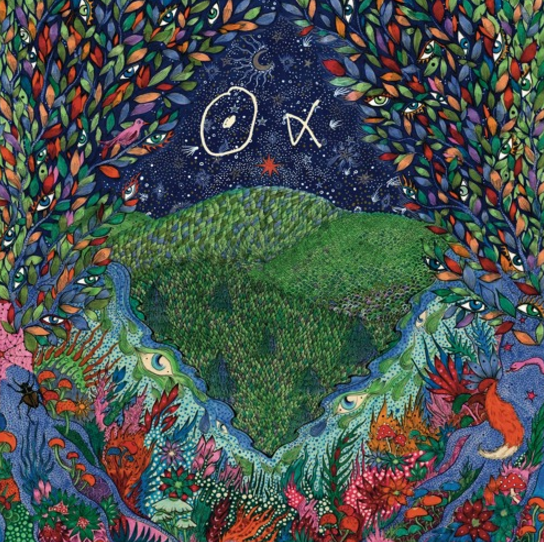
Well they’ve picked as good a spot as any to inspire them, out in the dense woodlands and on the mountains that make up part of the famous Catskills landscape. Part of the larger Appalachians, this film set backdrop and gravitas inspiration for the Hudson River School of painters has always been a draw for creatives of every stripe. It’s home to Woodstock for Christ sake; how could it not be a mecca for musicians and artists.
That spirit, atmosphere now lends itself to the second album by the collaborative sonic partnership NOUS Alpha; bringing together the transatlantic and well-travelled sagacious musicianship of both the American composer, songwriter and founder of the multidisciplinary label hub Our Silent Canvas (the facilitator platform for this project) Christopher Bono and esteemed English producer, engineer, digital pioneer Gareth Jones. You expect great things from the duo’s combined CV, which includes Bono’s multiple experimental projects BARDO, Ghost Against Ghost and NOUS, and Jones’ countless production, engineering contributions to the Mute Records catalogue (including Crime And The City Solution, Depeche Mode, Erasure, Wire) and for introducing such luminaries as the Mode and Einstürzende Neubauten to sampling. In fact, some of those previous named doyens of the industrial and synthesized radiance pop scenes make themselves heard on this sophisticated mantra of the universal, blessed nature and more esoteric investigations: especially both Depeche Mode and Einstürzende Neubauten. Some of the sonic material is produced from the foliage, the stones and rocks picked up on the duo’s gong struck meditative strolls; and some of the sourced sounds for what they call ‘foraged sounds’ (great phrase that) came from a tranquil pond.
With grand spiritual plans of rejuvenation and self-discovery, it seems both Bono and Jones didn’t flinch away from stirring the waters of a darker sub-consciousness too: ‘Black Water’, as the title may suggest, sounds like a cloaked holy chorus of fraters rowing across the Styx; the waters around them slithery and atmosphere occult. But in the main we’re treated to the cathedral electronica of a cosmic, connective requiem; vaporised moody metallic ripples; a constantly in flux momentum of tapped, pattered sampled kinetic beats and calculations; and repeated, if cut-up and manipulated, mantras sent out into the wilds. It reminded me in places of both His Name Is Alive and Daniel Lanois, and on the album’s final woodland peregrination spell, ‘Forest Jam’, an Appalachian country astral version of Ash Ra Tempel: In my book that’s a winner. A light and shaded ‘walk in the woods’ with sparks of ingenuity and emotive transcendence, this continued collaboration sets an otherworldly, spiritual scene; a funnelled journey into the cerebral and back out into the expanse that offers sonic awakenings and meditative revelations aplenty.
IKLAN ‘Album Number 2’
(Soulpunk) 23rd April 2021

A collective, a manifesto that draws in a myriad of intergenerational artists, musicians and fashion designers from across three cities (Edinburgh, London and Birmingham) IKLAN once more dance towards the barricades with another iron fist in a velvet glove groove album of disarming soul-punk and R&B. For despite the complete purview of propaganda (the music being the main focus of a campaign of information networks, art, pamphlets and booklets) and protest diy ascetics, IKLAN’s sound is produced by Mercury Prize winner and stalwart of the UK underground scene for forty years, Tim London, who’s sagacious skills and experience lift it out of what could be a discordant, caustic rabble of rage.
It’s actually quite high value in that respect, mixing elements of post-punk, trip-hop, neo-soul, indie and pop together in a loose cross-pollination of influences that flows in natural cohesion: one minute Family Fodder, the next, Xenia Rubinos.
Taking it in turns to front each track on this latest eclectic album are the singer-nurse Law Holt, the JnP siblings (otherwise known as Jacqui and Pauline Cuff of the Leith Congregational Choir and the Soho Sisters Of Love), the Dalston-based Washington Rays’ Fabio D’Agostino (stepping in as the pay-as-you-go guru on the divine retribution ‘Come To My Church’) and Nigerian, via Scottish capital, singer Cheng Cheng. Holt as usual leads in this department with a voice that evokes a soulful imbued Merrill Garbus, FKA Twigs and Tamar Kamen. She appears on the lion’s share of material, from the Lilly Allen and M.I.A. bouncing to a carnival sauntering filthy lucre chanted ‘Money’, to the Morcheeba in cahoots with Tricky atonal and atmospheric turn churned-up industrial vortex ‘Funny Man’. London himself appears as a sort of Boggles faded (robot-like) voice on the saddened Stereolab Kosmische ‘Karaoke’: a hallucinogenic dreamy plaint to immortality on wax. JnP’s efforts include the Siouxsie Sioux fronts Crack Cloud strut with punk aria echoes ‘Big Boss’, and disconnected, surface-only ‘holiday romance’ on the Iberian coastline ‘Ola Ola’. Below a vaporous gauzy wash, Cheng Cheng channels Macy Gray as she pines in ‘lockdown isolation’ on the sparser, dub and kinetic beat tingled, wavy ‘Sure You’re Doing Fine’. Almost wistful, faded, lost in the enormity of the pandemic and divisive anxieties of our present times, the IKLAN collective aren’t so much resigned or indolent as controlled in firing broadsides at the ire of their discontent and scorn. Mental health, the Tories, the crushed desires of Capitalism’s losers, and the commercial, validation, enervation of art and music are all explored with a soulful energy of melodious strength; an album of earworms essentially. The intention, propaganda of change has never sounded so harmonious and well produced.
Bagaski ‘Final’
(See Blue Audio) 16th April 2021
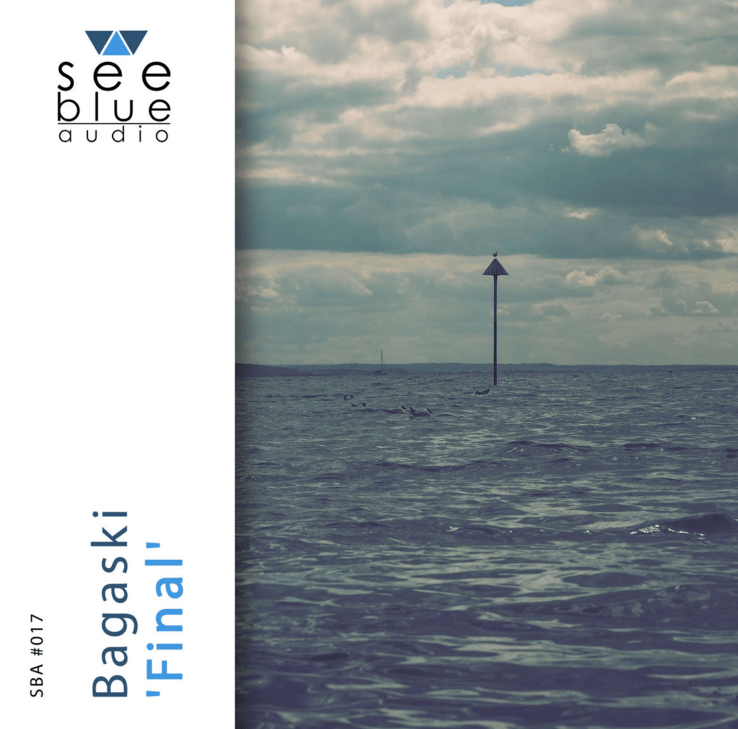
More shade than light we’re told in the label’s notes for this latest atmospheric album from the Barcelona-based imprint See Blue Audio – those fine providers and facilitators for some of the most unrushed sublime ambient, electronica and slow-release cinematic works from a rich roster of leading sonic explorers. Yet to these ears it seems the opposite might be true, as the Cretan traveller, now resident Berliner, Bagaski refracts, turns to face, and radiates from the shadows and darkened spaces of a synthesized soundscape towards the light on his newest album, Final.
From the opening reverent glasshouse Kosmische psalm to nature’s cathedrals in the sky ‘Spring Prayer’, to the caustic fizzled lapping tides and Roedelius modes of the descriptive explanation ‘Lydian Sequence & Filtered Noise’ (the ‘Lydian’ bit a reference to the atavistic F scale and Anatolian kingdom that gives it the name) there’s either a subtle hint of emitted light sources; sometimes a bathing radiance, at other times, as empirical, distant as a star twinkling in a great universal expanse.
Bagaski’s often translucent, vaporous world is as diaphanous as it is often mysterious and deep. For amongst the gentle breathes and blowing, the cloud hovering and incipient hazy, faded stirrings there’s passages of distilled scuzz and beats from the early days of Techno and House, and even further back to the birth of Mute Records – I’m sure I can hear the moody echoes of the first Human League incarnation wafting in the lunar strangeness, coo-y warbles and 2-step tetchy beats of ‘Bellcat Melt’.
But in many ways this sounds like a soundtrack imbued by those progenitors of the Kosmische sound (from Tangerine Dream and Conrad Schnitzler to Asmus Tietchens), especially on both the already mentioned springtime opener and the bookended ethereal veneration ‘Heartfelt IV’. Talking of the ethereal, the barely concealed ‘homage’ to 4AD Records’ own pioneers (‘AD4’) channels that label’s Shoegaze gauzy luminaries MBV and the equally beatific ambient, synwave and electronic music innovator His Name Is Alive on what is a short drifting passage.
A lovely affecting album of the tidal, spiritual, cosmic, Bagaski’s sonic odyssey is a most rewarding experience of adroit, ascending and lofted materialisations: another impressive if unassuming release on the selective See Blue Audio label – fast becoming a stamp of excellence.
Orca, Attack! ‘C.M.S.O. (Learning By Listening Vol.1)’
16th April 2021
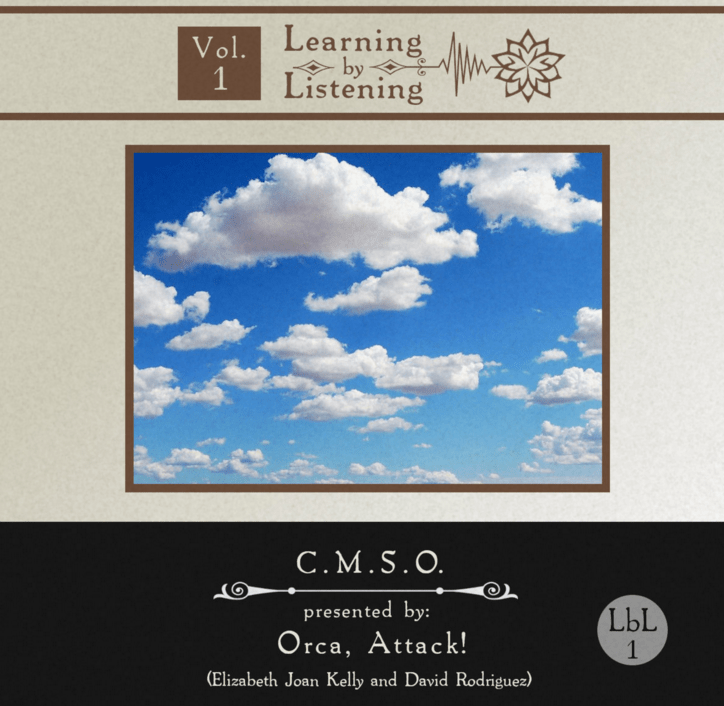
Not a million light years away from the orbital draw of New Orleans sonic siren Elizabeth Joan Kelly’s afflatus celestial imperilled Farewell, Doomed Planet album (featured back on the Monolith Cocktail in November of 2019), this latest venture, in collaboration with fellow Orleans writer, teacher and musician David Rodriguez, once more travels in the cosmic, astral direction. Under the killer whale actionist moniker the duo embrace the Tomorrow’s World library music visions of Raymond Scott (plus a touch of both the equally maverick Bruno Spoeri and Franco Battiato), Star Trek Foley and nods to Tangerine Dream and Air Liquide on a conceptual suite part tech guru mindfulness, part new age middle management speak and part self-help navigated gobbledegook.
Under the auspices and the inaugural chapter of the ‘Strategic Tape Reserve’ series – in short, ‘an instructive cassette tape series designed to bring information of the world into your home and your brain’ -, the kitsch consultancy entitled ‘Course Management System Optimization’ programme plunges the listener into this creative partnership’s odd knowing electronic world of theatrics and retro-futurism.
A writer of repute on the failures of tech, communication and self-preservation, Rodriguez (who also files his musical experiments under Alison’s Disapproval) lends a constantly filtered and affected spoken word narration across all six tracks as Kelly swans, touches the ethereal with her diaphanous woos, calls, arias (a merger of Laurie Anderson, cosmic opera and Jane Weaver). Often transmogrified by robotic effects and the slowing and speeding up of that instructive monologue, Rodriguez’s message is constantly warped, broken up: sometimes on the verge of some Max Headroom glitch stutter, or the slurred falling apart speech of HAL.
Musically the mood weaves serenely between a Kosmische floatation tank and more ominous pitched piped reverent organ scares. A suffusion of various filters, modulators, oscillations and arpeggiator do their work in coating this experiment with an almost tongue-in-cheek homage to the more altruistic, hopeful early pioneers of Electronica and those who never set out to be corralled into such a pigeon hole vacuum of genre demarcation but found themselves filed under Library music. There’s obviously some serious message hiding within the playful spirit of enterprise and scrambled self-help therapy, but for the most part this is a strange glide and traverse across the astral planes that’s well worth the price of travel.
In Short:
There now follows condensed mentions and recommendations that I also found appealing:
Federico Balducci ‘And Watch The Earth Below (Cadet Chronicles I)’
2nd April 2021
The prolific adroit guitar sculptor takes an untethered flight above the clouds on his most recent gently resonating, spacey and drifting album. Signature spells of the jazzy, empirical, neo-classical, ambient and experimental merge on a most beautiful scenic and inner meditation. Whether floating in a hot-air balloon, accompanied by sparse Leaf Label like slow beats and dipped and wafted hanging notes, or in a more spherical dreamy broadcast, touching on the cosmic, Balducci uses the subtlest, most gentle of touches: even on the album finale, ‘Bridgers’, which echoes along on a bed of coarser droning electric guitar sustain. An incredible album to lose yourself in.
See also Balducci’s recent collaboration atmospheric soundtrack of paranormal like communications and drifts with Fourthousandblackbirds, Anta Odeli Uta.
David Newlyn ‘Tapes And Ghosts’
(Somewherecold Records) 30th April 2021
Deserves far more room than I’m able to give this month, but the seductively diaphanous lower case ambient suites of the UK’s David Newlyn need raving about (quietly). The Cathedral Transmissions label boss is set to release this mostly peaceable, sensory illusion of neoclassical and Cluster/Roedelius imbued compositions on the ridiculously prolific North American facilitator Somewherecold Records at the end of this month.
Elegant, adroit, spacious and also ruminating, Tapes And Ghosts draws you in to a softly composed sublimity. I implore you to try it. Better still, buy into it.
Daughters Of The Desert ‘Sorrow Soothe’
(New Cat) 26th March 2021
Through mutual appreciation, coming together in the Resonance FM hothouse, three daughters of the hallowed and illusionary desert join forces on the plaint soundscape and mirage rich Sorrow Soothe album. Regular readers will (hopefully) recognize one of those sand dune traversing sisters, the diaphanous-breathed enchantress Esbe (featured on the blog last year with the congruous desert bathed epic Saqqara). That composer, and producer on this album, siren is joined on this both vexed and fantastical odyssey by the writer, presenter Jude Cowan Montague and audio engineer Mia Kukathasan. All three have a special connection, roots or affinity to the desert landscape they now use as a mysterious, aching and reverberating backdrop.
Magical and echoed with mystical electronica, Sorrow Soothe is a most stunning, vaporous, venerable and dreamy resonated merger of electronica, the filmic and vocal incantations, enchantments and lament. Desert songs have seldom sounded so atavistic yet modern: especially when dealing with the prescient themes of the times, as this album does. It’s a brilliantly conceived atmospheric project, pulled together in isolation and in the middle of a pandemic.
See Esbe’s review here from last September (Here).
Hi, my name is Dominic Valvona and I’m the Founder of the music/culture blog monolithcocktail.com For the last ten years I’ve featured and supported music, musicians and labels we love across genres from around the world that we think you’ll want to know about. No content on the site is paid for or sponsored and we only feature artists we have genuine respect for /love. If you enjoy our reviews (and we often write long, thoughtful ones), found a new artist you admire or if we have featured you or artists you represent and would like to buy us a coffee at https://ko-fi.com/monolithcocktail to say cheers for spreading the word, then that would be much appreciated.
[…] Woke up this morning to quite a few happy notifications. First, Monolith Cocktail has a great write-up of C.M.S.O. This lovely excerpt should get you to want to read the whole thing: […]
[…] Daughters Of The Desert ‘Sorrow Soothe’ […]
[…] Bagaski ‘Final’ (See Blue Audio)(DV) Review […]
[…] David Newlyn ‘Tapes And Ghosts’ (Somewherecold)(DV) Review […]
[…] Comorian ‘We Are An Island, But We’re Not Alone’ […]